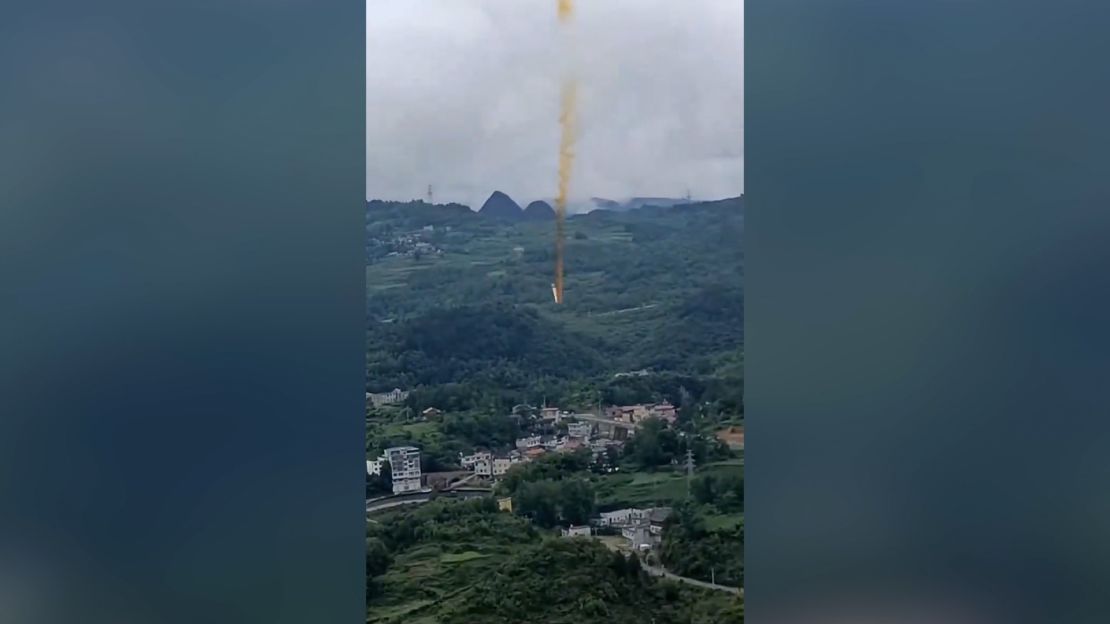Hong Kong
CNN
—
Suspected particles from a Chinese language rocket was seen plummeting to the bottom over a village in southwest China on Saturday, leaving a path of vivid yellow smoke and sending villagers working, in accordance with movies on Chinese language social media and despatched to CNN by a neighborhood witness.
The dramatic footage surfaced on-line shortly after a Lengthy March 2C provider rocket blasted off at 3p.m. native time Saturday (3 a.m. Jap Time) from the Xichang Satellite tv for pc Launch Heart within the southwestern province of Sichuan.
The rocket despatched into orbit the House Variable Objects Monitor, a strong satellite tv for pc developed by China and France to review the farthest explosion of stars referred to as gamma-ray bursts.
Chinese language chief Xi Jinping has vowed to ascertain the nation as a dominant house energy, ramping up missions to compete with different main world powers, together with america.
Saturday’s launch was declared a “full success” by the China Aerospace Science and Expertise Company (CASC), a state-owned contractor that developed the Lengthy March 2C rocket.
CNN has reached out to the CASC and the State Council Data Workplace, which handles press inquiries for the Chinese language authorities, together with its house company, for remark.
A video posted on Kuaishou, a Chinese language short-video web site, appeared to point out an extended, cylindrical formed piece of particles falling over a rural village and crashed subsequent to a hill, with yellow smoke billowing from one finish.
CNN geolocated the video to be filmed from Xianqiao village in Guizhou province, neighboring the launch web site province of Sichuan to the southeast. The video was posted on Kuaishou from an IP deal with in Guizhou.
Different movies circulating on Chinese language social media platforms analyzed by CNN confirmed a number of angles of the falling particles. In one among them, villagers, together with youngsters, had been seen working away whereas trying again on the orange path within the sky, with some overlaying their ears for the crash.
Some movies had been taken down by Monday afternoon.
Witnesses on social media stated they heard a loud explosion after the particles crashed into the bottom. An eyewitness informed CNN they noticed the rocket fall with their “personal eyes.” “There was a pungent odor and the sound of an explosion,” they added.
In a now-deleted authorities discover reposted by a neighborhood villager shortly after the launch, authorities stated that Xinba City, close to Xianqiao village, was going to hold out a “rocket particles restoration mission” from 2:45 p.m. to three:15 p.m. native time on Saturday.
Residents had been requested to go away their houses and different buildings an hour earlier than the launch and scatter out in additional open areas to look at the sky. They had been warned to stay away from the particles to forestall hurt from “poisonous fuel and explosion,” in accordance with the discover.
Residents had been additionally “strictly forbidden” to take pictures of the particles or “unfold related movies on-line,” the discover stated.
There have been no studies of fast accidents from native authorities.

Markus Schiller, a rocket skilled and affiliate senior researcher on the Stockholm Worldwide Peace Analysis Institute, stated the particles gave the impression to be the primary stage of the Lengthy March 2C rocket, which makes use of a liquid propellant consisted of nitrogen tetroxide and unsymmetrical dimethylhydrazine (UDMH).
“This mixture at all times creates these orange smoke trails. It’s extraordinarily poisonous and carcinogenic,” Schiller stated. “Each dwelling being that inhales that stuff can have a tough time within the close to future,” he added.
Such incidents occur ceaselessly in China because of the location of its launch web site, he stated.
“If you wish to launch one thing to low Earth orbit, you often launch it within the easternly path to get some further increase from the rotation of the Earth. However in case you launch to the east, there are undoubtedly at all times some villages within the pathway of the boosters of the primary stage.”
Most rockets in China are blasted from the nation’s three inland launch websites – Xichang within the southwest, Jiuquan within the Gobi Desert within the northwest, and Taiyuan within the north. Constructed in the course of the Chilly Conflict, these bases had been intentionally situated removed from the coast out of safety issues.
In 2016, a fourth launch web site, Wenchang, opened in Hainan Island, the nation’s southernmost province.
As compared, NASA and the European House Company often launch their rockets from coastal places towards the ocean, stated Schiller, who’s additionally a director of ST Analytics in Munich, Germany.
Western house companies have additionally largely phased out the sort of extremely poisonous liquid propellants for his or her civilian house packages, which China – and Russia – nonetheless use, he added.
Multi-staged rockets shed particles shortly after blast-off, alongside trajectories that may be predicted earlier than the launch.
Earlier than every launch, China’s civil aviation authority usually points a discover to pilots, referred to as NOTAM, to warn them towards the “non permanent hazard areas” the place rocket particles are prone to be falling.
Particles from Chinese language rockets have hit villages earlier than. In December 2023, the particles of a rocket landed in southern Hunan Province, damaging two homes, state media reported. In 2002, a boy in northern China was injured when fragments from a satellite tv for pc launch fell on his village in Shaanxi province.
“I anticipate that we’ll see one thing like that for fairly some time, for a few years to come back,” Schiller.
China has beforehand confronted criticism from the worldwide house group for its dealing with of particles from its out-of-control rocket boosters after they reenter Earth.
In 2021, NASA lambasted China for its failure to “meet accountable requirements” after particles from its out-of-control Lengthy March 5B rocket plunged into the Indian Ocean simply west of the Maldives after reentering the environment.











